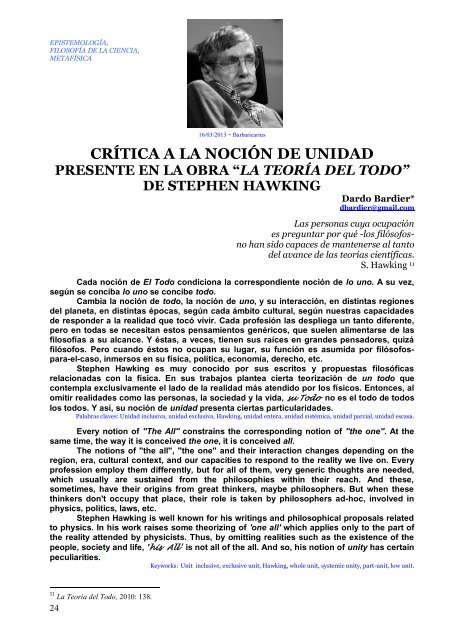ariel-14
ariel-14
ariel-14
You also want an ePaper? Increase the reach of your titles
YUMPU automatically turns print PDFs into web optimized ePapers that Google loves.
EPISTEMOLOGÍA,<br />
FILOSOFÍA DE LA CIENCIA,<br />
METAFÍSICA<br />
16/03/2013 ~ Barbaricarius<br />
CRÍTICA A LA NOCIÓN DE UNIDAD<br />
PRESENTE EN LA OBRA “LA TEORÍA DEL TODO”<br />
DE STEPHEN HAWKING<br />
Dardo Bardier*<br />
dbardier@gmail.com<br />
Las personas cuya ocupación<br />
es preguntar por qué -los filósofosno<br />
han sido capaces de mantenerse al tanto<br />
del avance de las teorías científicas.<br />
S. Hawking 11<br />
Cada noción de El Todo condiciona la correspondiente noción de lo uno. A su vez,<br />
según se conciba lo uno se concibe todo.<br />
Cambia la noción de todo, la noción de uno, y su interacción, en distintas regiones<br />
del planeta, en distintas épocas, según cada ámbito cultural, según nuestras capacidades<br />
de responder a la realidad que tocó vivir. Cada profesión las despliega un tanto diferente,<br />
pero en todas se necesitan estos pensamientos genéricos, que suelen alimentarse de las<br />
filosofías a su alcance. Y éstas, a veces, tienen sus raíces en grandes pensadores, quizá<br />
filósofos. Pero cuando éstos no ocupan su lugar, su función es asumida por filósofospara-el-caso,<br />
inmersos en su física, política, economía, derecho, etc.<br />
Stephen Hawking es muy conocido por sus escritos y propuestas filosóficas<br />
relacionadas con la física. En sus trabajos plantea cierta teorización de un todo que<br />
contempla exclusivamente el lado de la realidad más atendido por los físicos. Entonces, al<br />
omitir realidades como las personas, la sociedad y la vida, su Todo no es el todo de todos<br />
los todos. Y así, su noción de unidad presenta ciertas particularidades.<br />
Palabras claves: Unidad inclusiva, unidad exclusiva, Hawking, unidad entera, unidad sistémica, unidad parcial, unidad escasa.<br />
Every notion of "The All" constrains the corresponding notion of "the one". At the<br />
same time, the way it is conceived the one, it is conceived all.<br />
The notions of "the all", "the one" and their interaction changes depending on the<br />
region, era, cultural context, and our capacities to respond to the reality we live on. Every<br />
profession employ them differently, but for all of them, very generic thoughts are needed,<br />
which usually are sustained from the philosophies within their reach. And these,<br />
sometimes, have their origins from great thinkers, maybe philosophers. But when these<br />
thinkers don't occupy that place, their role is taken by philosophers ad-hoc, involved in<br />
physics, politics, laws, etc.<br />
Stephen Hawking is well known for his writings and philosophical proposals related<br />
to physics. In his work raises some theorizing of 'one all' which applies only to the part of<br />
the reality attended by physicists. Thus, by omitting realities such as the existence of the<br />
people, society and life, 'his All' is not all of the all. And so, his notion of unity has certain<br />
peculiarities. 11<br />
Keyworks: Unit inclusive, exclusive unit, Hawking, whole unit, systemic unity, part-unit, low unit.<br />
11 La Teoría del Todo, 2010: 138.<br />
24


